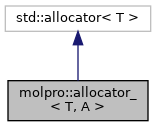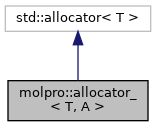#include <memory.h>
Inheritance diagram for molpro::allocator_< T, A >:

Collaboration diagram for molpro::allocator_< T, A >:

Classes | |
| struct | rebind |
Public Types | |
| typedef T | value_type |
| typedef value_type * | pointer |
| typedef const value_type * | const_pointer |
| typedef value_type & | reference |
| typedef const value_type & | const_reference |
| typedef std::size_t | size_type |
| typedef std::ptrdiff_t | difference_type |
Public Member Functions | |
| pointer | address (reference r) |
| const_pointer | address (const_reference r) const |
| pointer | allocate (size_type cnt, typename std::allocator< void >::const_pointer=nullptr) |
| void | deallocate (pointer p, size_type) |
| size_type | max_size () const |
| template<typename U > | |
| void | construct (U *ptr) noexcept(std::is_nothrow_default_constructible< U >::value) |
| template<typename U , typename... Args> | |
| void | construct (U *ptr, Args &&... args) |
| bool | operator== (allocator_ const &) |
| bool | operator!= (allocator_ const &a) |
Detailed Description
template<typename T, typename A = std::allocator<T>>
class molpro::allocator_< T, A >
An allocator suitable for use with STL, that monitors usage If the symbol MOLPRO_MEMORY_FORTRAN is defined, allocation is outsourced to the fortran memory allocator, otherwise it is done with malloc().
Member Typedef Documentation
◆ const_pointer
template<typename T , typename A = std::allocator<T>>
| typedef const value_type* molpro::allocator_< T, A >::const_pointer |
◆ const_reference
template<typename T , typename A = std::allocator<T>>
| typedef const value_type& molpro::allocator_< T, A >::const_reference |
◆ difference_type
template<typename T , typename A = std::allocator<T>>
| typedef std::ptrdiff_t molpro::allocator_< T, A >::difference_type |
◆ pointer
template<typename T , typename A = std::allocator<T>>
| typedef value_type* molpro::allocator_< T, A >::pointer |
◆ reference
template<typename T , typename A = std::allocator<T>>
| typedef value_type& molpro::allocator_< T, A >::reference |
◆ size_type
template<typename T , typename A = std::allocator<T>>
| typedef std::size_t molpro::allocator_< T, A >::size_type |
◆ value_type
template<typename T , typename A = std::allocator<T>>
| typedef T molpro::allocator_< T, A >::value_type |
Member Function Documentation
◆ address() [1/2]
template<typename T , typename A = std::allocator<T>>
|
inline |
◆ address() [2/2]
template<typename T , typename A = std::allocator<T>>
|
inline |
◆ allocate()
template<typename T , typename A = std::allocator<T>>
|
inline |
◆ construct() [1/2]
template<typename T , typename A = std::allocator<T>>
template<typename U >
|
inlinenoexcept |
◆ construct() [2/2]
template<typename T , typename A = std::allocator<T>>
template<typename U , typename... Args>
|
inline |
◆ deallocate()
template<typename T , typename A = std::allocator<T>>
|
inline |
◆ max_size()
template<typename T , typename A = std::allocator<T>>
|
inline |
◆ operator!=()
template<typename T , typename A = std::allocator<T>>
|
inline |
◆ operator==()
template<typename T , typename A = std::allocator<T>>
|
inline |
The documentation for this class was generated from the following file:
- /__w/utilities/utilities/src/molpro/memory.h